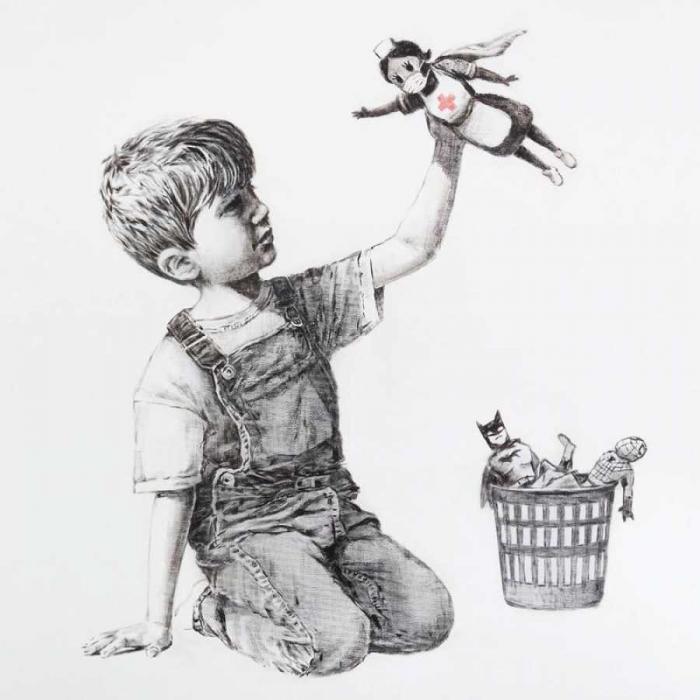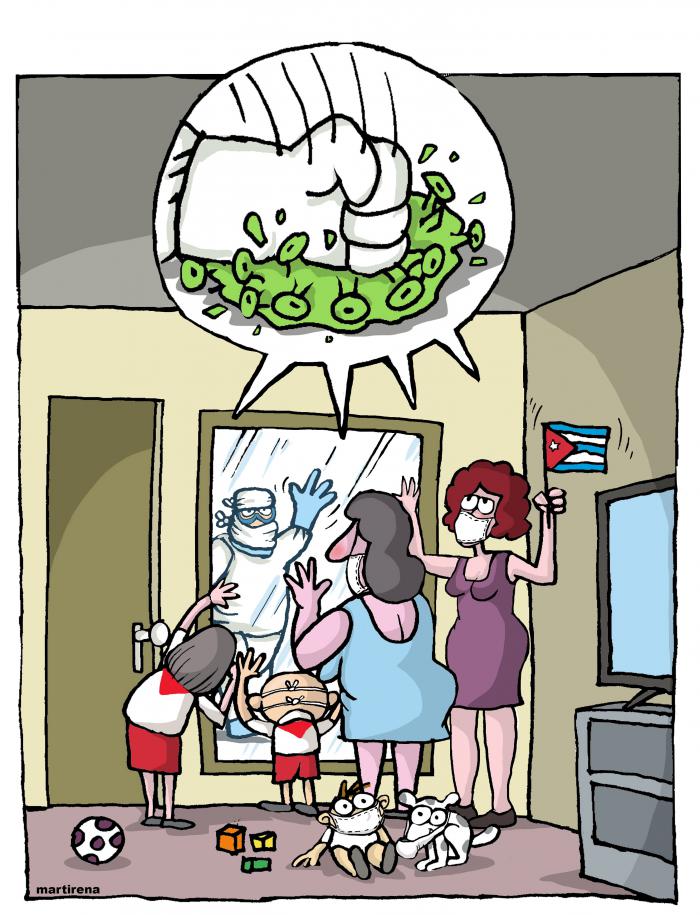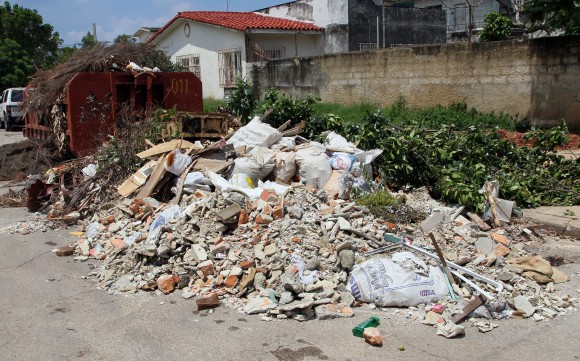Social Indiscipline 4
Banish Indiscipline, Mobilize Consciousness

Banish Indiscipline, Mobilize Consciousness
Putting indiscipline at bay is not only necessary, but imperative. Let us integrate that team called consciousness, which demands shame and good judgement.
By Madeleine Sautié | madeleine@granma.cu
August 3, 2020
Translated and edited by Walter Lippmann for CubaNews.

Image by Bansky
There was a day when Havana, still in the early stages of the pandemic’s de-escalation, awoke to the happy news that no new positive cases were being reported. Spirits, then, shot up, since the expected zero marked the result of a country’s enormous effort, say, among many workers, that of its doctors, in the first place.
Today, the faces are not the same, and concern is growing at the same time as the numbers and the courage to give so much. Unforgivable are the failures which, due to irresponsibility and disbelief, have modified the results we’ve achieved. Example: insolent disregard for a health system and the management of the Cuban state, applauded for the efficiency of its task, even by those who insist on seeing the erasures in an increasingly admirable health scenario.
Then comes the “must do”, the “have to take action”, as if banishing disobedience was only the business of a few. It is no secret that the legal provisions and police authorities have – as they have done from day one – a great weight in the fulfillment of the guidelines.
However, it is unthinkable that the solution lies only in the application of fines or in ensuring that the law enforcement officers are where every [act of] indiscipline is. It is enough to look out on the balcony, or to walk through our streets, to see, in a perfectly peaceful environment, where the police do not have to be, two or three people talking, one almost on top of the other, without nasobucos! -Will there really be a policeman for each of these cases?
There are two sides to this. On the first side, there are those who protect themselves and their family, compañeros and neighbors through good hygiene practices and distance, those who contribute to the dissipation of the virus; those who reverence with discipline the vigilance of the health personnel and value the happiness of living in Cuba, when the world suffers daily from overwhelming scenes.
The others, the ones who barely inform themselves, the irreverent ones who are aware of their own danger and that of the others; the ones who allow themselves to be spoken to from upstairs, and without nasobucos; the ones who know how to be attended to if the virus knocks on their door; the ones who are more bored than anyone else, who need to attend the party that another sorry person prepares.
Putting indiscipline at bay is not only necessary, but imperative. Let’s join that team called conscience, which calls for [both] shame and sanity.
Irresponsibility Puts Lives at Risk


Irresponsibility Puts Lives at Risk
It is necessary to close every gap where the new coronavirus enters, almost always accompanied by indolence, insensitivity and carelessness.
Author: Ortelio González Martínez | internet@granma.cuApril 8, 2020 23:04:55
Translated and edited by Walter Lippmann for CubaNews.

In a farewell celebration in Limpios Grandes, a community of a little more than 200 inhabitants belonging to the territory of Florencia, a traveler from the United States did not imagine that he would leave such a sad mark when, in the second half of March, he returned to his country of origin. There there were several people left infected with the new coronavirus, a figure that today reaches 17 patients, starting with case zero: a young woman who was only 18 years of age confirmed as positive on April 2.
The girl had close ties with the visitor and in turn with relatives in the community, which is why six of those confirmed live here, including some children. Another five confirmed cases are from the Florencia headwaters, allegedly infected at a family party she attended.
The value of the constructive criticism made by President Miguel Díaz-Canel Bermúdez at the meeting to follow up on the plan approved by the Cuban Government for the prevention and control of the new coronavirus on the island is based on the purpose of achieving a favorable change that will benefit each and every one of the people, whether or not they are involved in the current pandemic that is sweeping Cuba.
Without half-measures, he emphasized that “we still have to criticize those who are still reluctant to abide by the discipline necessary to keep the curve of the disease as flat as possible.
“This is not a request,” he said, “it is an obligation that we must assume with citizen responsibility and that must help us fulfill our institutions of internal order that are deployed, along with their people, in these difficult days.
“Life is telling us that, when someone hides information about their health status, we can mourn the loss of a life and we can mourn other lives that are put at risk.
In the face of the new coronavirus, there are no crossed arms in Ciego de Avila. Evaristo González Camacho, provincial director of the Integral Direction of Supervision, confirms figures: 3,727 inspections carried out, 1,862 fines imposed in the amount of 794,165 pesos; 813 warnings and 22 licenses to practice self-employment withdrawn (basically related to price violation).
The Provincial Prosecutor’s Office, for its part, had filed 20 cases as of 2 April, 11 of which were prosecuted as crimes of spreading epidemics, punishable under article 187 of the Criminal Code. These were generally persons who had violated the need for isolation, an extremely irresponsible behavior.
In addition, more than 327,000 investigations are carried out every day by medical and dental students, together with doctors, family nurses and political and mass organizations. “Now the important thing is to go deeper into the quality of the research,” Dr. Osvaldo Ivañez, provincial director of health, said at a press conference.
However, gaps exist. There is still a need to denounce in a timely manner the inappropriate conduct of the people, the people’s council and the on the block, because everything cannot be left to the forces of MININT.
It is necessary to act more rigorously in confronting the illegalities and behaviors that in the midst of the pandemic put people’s lives at risk; a call that the country’s highest leadership never tires of making.
Two people from Ciego de Avila died from sars-CoV-2, in the popular council of Florencia with a local transmission event, as well as the town of Turiguanó, 88 people in the isolation centers and figures with a tendency to grow in several municipalities. These, set off the alarms in the province, located among those with the most diagnosed cases (48) in the country.
It is necessary to close any gap where the new coronavirus enters, almost always accompanied by indolence, insensitivity and lack of concern.
The Law and the Virus

The Virus and the Law
By Mileyda Menéndez Dávila
March 24, 2020
Translated and edited by Walter Lippmann for CubaNews.
“Yeah, I know what they’re gonna tell me, if I’m on the street for fun they’re gonna give me a ticket. So what? So I have another reason to get out of the house: to pay them. I’m not going to be locked up! If what you get, you get one day…
The (not so few) people traveling on the A95 this Monday would think that my (involuntary) chat partner would be joking, but I chose to think that her bravado, bordering on indolence, was her way of dealing with something that makes her nervous and she doesn’t dare to admit it.
“Let’s see, why aren’t you locked up,” she tried to challenge me by staring at her. “I’m going to work,” I explained, and she took advantage of the situation to justify herself: “And I’m going to fight! They brought out detergent in the Vedado and I already have a point that buys at a premium everything I get. For me, that’s ham, because I form my own in a line and I see the load.
I sighed long and deep. Explaining to the lady the legal and moral implications of her conduct would be like plowing in the sea. But people were paying attention to her gestures and I decided to take advantage of the improvised mobile platform for a preventive civic talk, including the teenager who was clearly accompanying her on the “walk”.
“It’s not just fines: You can be imprisoned for three months to a year… to begin with,” I let out in an intriguing voice, assuming that her “bogeyman” would be to lose his freedom. She raised an eyebrow, and still with a cheek, asked, “Why is that?”
“Because that is the penalty for those who commit crimes against public health, such as spreading epidemics or refusing to collaborate with the health authorities in campaigns to prevent them,” I said, summarizing Article 187 of the Cuban Penal Code. Then, without pause, I reinforced the blow: “If you also boast, as you do now, it can be assumed that you are acting maliciously and the penalty is five to eight years. Ah! and as an author, not an accomplice, so there is no reduction”.
She took a breath, as if to reply in a not very good way, and I took advantage of her gesture to add: “They also give three months to a year to anyone who incites others not to take action against an epidemic, so go on adding up… And if “doing your thing” is to create panic to tangle up the tail, that crime costs you one year to three more. And, of course, contempt for the authorities–and those who report actions at the Mesa Redonda are contempt for the authorities–is also a crime, and failure to take care of your dependents is also a crime under the law.
In front of us, a young man followed my monologue of legalese, splashed by the speaker with that sound that in Cuba we call “frying eggs”. His face showed disbelief, but he did not dare to support or deny the alleged anarchist.
Another gentleman, standing near the door, commented that, even putting it all together, the penalty was little for the gravity of the moment, So that gave me grounds to say that if injuries or deaths are proved to have been caused by an irresponsible attitude, the penalty is multiplied in years, not counting the punishment for hoarding products in an illicit economic activity.
“You want to put more fear into it than the coronavirus,” he cut off my explanation, no longer smiling. “And with me, that doesn’t walk. Besides, putting people in jail doesn’t solve the problem,” he insisted on defending himself, but the young man finally took a stand for common sense: “What not? If you stop exposing others with that, it will surely work, and in the long run, people will understand that this is serious, so let’s get back, pure, get back!
Fines Up to 3,000 Pesos for Littering

Since March in Havana, Fines of Up to 3,000 pesos for Throwing Debris Outside Established Sites
February 20, 2020
Translated and edited by Walter Lippmann for CubaNews.

As of March, those who generate cadres like this in the Cuban capital will have to think about it and comply with the regulations of the local authorities. Photo: Ismael Francisco/Cubadebate
The provincial government of Havana, as part of the People’s Movement for a More Beautiful, Cleaner and Healthier Havana, has established that the state entities or families that carry out constructive actions in their properties are responsible for the final destination of the rubble generated. It must be deposited only in the sites defined for that purpose by the people’s councils.
As of March 1, this provision, in accordance with the City’s Ornamental Regulations, also establishes that the rubble may be deposited at the points defined by each people’s council, which will never coincide with the traditional points for depositing domestic waste.
In the case of residents in the municipalities of Central Havana and Old Havana, citizens and entities may contract the debris collection service to the Water Company of Havana.
In the remaining municipalities, this can be done by contacting the Provincial Direction of Hygiene, through the telephone numbers 7260-1440, Command Post, and 7260-3011, Commercial Department.
Violation of the rules may be subject to a fine of up to 3,000 pesos.
It is also established that each state or social entity is responsible for the permanent cleaning and beautification of its establishments, including its perimeter environment.
The structures of each people’s council, in close coordination and with the active participation of the CDR, FMC, CTC, ANAP and the Association of Combatants, will systematically develop mobilization actions aimed at maintaining cleanliness in the community, calling on families to deposit household waste at established collection points and during the hours of 6:00 p.m. to 10:00 p.m.
Those who violate this communal hygiene norm could be fined up to 1,500 pesos. Similarly, the person responsible for collecting the waste may be fined similarly if he or she fails to comply with it.
Subscribe to Blog via Email
| M | T | W | T | F | S | S |
|---|---|---|---|---|---|---|
| 1 | 2 | 3 | 4 | 5 | 6 | 7 |
| 8 | 9 | 10 | 11 | 12 | 13 | 14 |
| 15 | 16 | 17 | 18 | 19 | 20 | 21 |
| 22 | 23 | 24 | 25 | 26 | 27 | 28 |
| 29 | 30 | |||||


You must be logged in to post a comment.